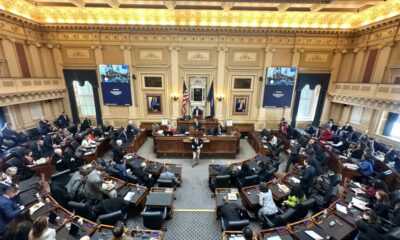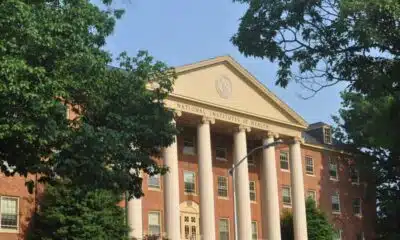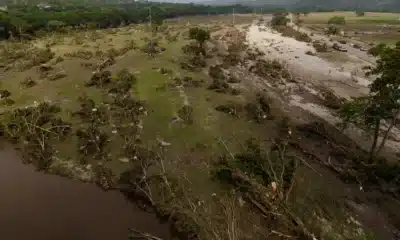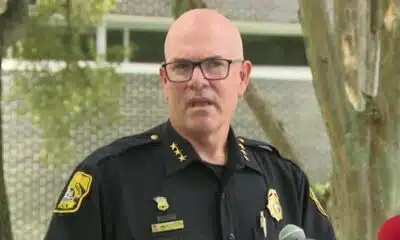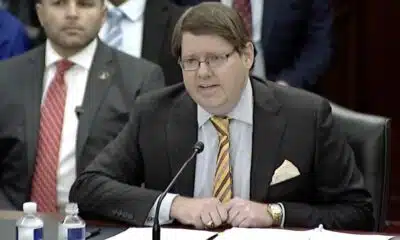News from the South - West Virginia News Feed
WV House committee considers ‘Make America Healthy Again’ bill restricting SNAP purchases
WV House committee considers ‘Make America Healthy Again’ bill restricting SNAP purchases
by Lori Kersey, West Virginia Watch
February 19, 2025
A West Virginia House of Delegates committee is considering legislation that would prohibit recipients of the Supplemental Nutrition Assistance Program, commonly known as food stamps, from using their benefits to purchase soft drinks and candy.
House Bill 2350, and similar legislation around the country, is part of an effort promoted by the Trump administration and U.S. Health and Human Services Secretary Robert F. Kennedy Jr. to “Make America Healthy Again.”
The bill was before the Committee on Health and Human Resources for a hearing on Tuesday.
It would require the cabinet secretary for the Department of Human Services to request a federal waiver to prohibit the purchase of candy and soft drinks with SNAP benefits. If the waiver is not granted, the bill says the secretary would ask for such a waiver annually until the waiver is granted.
Bill sponsor Del. Adam Burkhammer, R-Lewis, said the legislation is meant to promote healthy options for SNAP recipients.
More than 144,000 West Virginia households got SNAP benefits in December 2024, according to the state Bureau for Family Assistance.
Opponents of the bill say the legislation would have a negative effect on the state’s grocery stories, particularly in counties that border other states.
Facing restrictions in West Virginia, SNAP recipients who live near the state’s borders are likely to drive across state lines to use their benefits, said Seth DiStefano, policy outreach director for the Center on Budget and Policy.
“The direct result — long story short, is that grocery stores close,” he said. “And grocery stores closing is very bad for the health of an entire community. Food deserts get worse. Options become less.”
Restrictions and “poverty shaming” won’t improve health, he said.
“The only real impact so far as I could tell is that it’s going to put a lot of folks in those border counties, it’s going to give them a choice,” DiStefano said. “Do I want to sit in line and be embarrassed when I get into a back and forth with a cashier who may not have coded something correctly with my kid in line? Or do I take my business across the river to Gallipolis or Belpre or Steubenville or Hagerstown or any myriad of towns where folks just simply don’t have to deal with the administrative hassle and the increased embarrassment and stigma that a bill like this puts on them?”
Burkhammer responded to concerns about the bill’s economic impact by saying that poor health has an economic impact as well.
“I would say that there is a continued economic negative impact if we continue to fuel childhood diabetes, diabetes and so forth with that,” he said. “So I understand that concept and I understand we’re a body that has to consider the financial impact on every decision almost that we make and this is one of those that I was willing to make that financial decision to say the health and the wellbeing of our state and our communities is greater than the financial risk that is potential.”
He added that SNAP recipients still have the option to purchase candy and soft drinks with their own money.
Del. Mike Pushkin, D-Kanawha, raised concerns about the definition of candy and soft drinks in the bill.
According to the bill, soft drinks are “nonalcoholic beverages that contain natural or artificial sweeteners. Soft drinks do not include beverages containing milk or milk products, soy, rice or similar milk substitutes or greater than 50% of vegetable or fruit juice by volume.
Candy, according to the bill, means “a preparation of sugar, honey or other natural or artificial sweeteners in combination with chocolate, fruits, nuts or other ingredients or flavorings in the form of bars, drops or pieces.” It does not include any preparation containing flour and does not require refrigeration.
Burkhammer said a forthcoming committee substitute would allow the cabinet secretary to define candy and soft drinks.
The bill did not include a cost estimate as of Wednesday.
Kennedy suggested banning soda and candy purchases by the SNAP program during an interview last week with Fox News, Forbes reported.
“The one place that I would say that we need to really change policy is the SNAP program and food stamps and in school lunches,” Kennedy told Fox News host Laura Ingraham. “There, the federal government in many cases is paying for it. And we shouldn’t be subsidizing people to eat poison.”
The bill and others like it around the country are supported by the Opportunity Solutions Project, a partner organization to the conservative group Foundation for Government Accountability.
Jeremiah Samples, the former deputy secretary of the state Department of Health and Human Resources who is now a lobbyist for the Opportunity Solutions Project, spoke in support of the legislation.
“[The bill] really starts a dialogue between the states and the federal government, which we now have a partner in the Trump administration to really address these issues to tackle what everyone knows and recognizes is a major problem in what is called the Supplemental Nutrition Assistance Program,” he said. “Nutrition. We have lost the nutrition part of the SNAP program.”
GET THE MORNING HEADLINES.
West Virginia Watch is part of States Newsroom, a nonprofit news network supported by grants and a coalition of donors as a 501c(3) public charity. West Virginia Watch maintains editorial independence. Contact Editor Leann Ray for questions: info@westvirginiawatch.com.
The post WV House committee considers ‘Make America Healthy Again’ bill restricting SNAP purchases appeared first on westvirginiawatch.com
News from the South - West Virginia News Feed
Historically redlined communities have slower EMS response times
by Nada Hassanein, West Virginia Watch
August 5, 2025
Residents of historically redlined communities experience slower response times from emergency medical services, according to a study published Tuesday in JAMA Network Open.
Redlining refers to the discriminatory practice under which the federal government and banks systematically denied mortgages to Black and Hispanic residents. The practice deemed neighborhoods with higher proportions of nonwhite residents to be undesirable and financially risky for mortgage lending.
Researchers mapped locations of EMS centers across 236 cities and analyzed maps produced in the 1930s by the Home Owners’ Loan Corporation. The government agency, created as part of the New Deal, consistently ranked majority-Black areas as “hazardous” for lending. Redlining has been illegal since enactment of the federal Fair Housing Act in 1968.
The research team calculated average EMS response times using the location of ambulance, fire and rescue services and historical traffic data. “Rapid” response was defined as five minutes or less, the benchmark set by the National Fire Protection Association for high-priority patients with life-threatening conditions.
The team found that more than 2.2 million people lack rapid EMS access. Areas historically graded “D” — financially “hazardous” for mortgage lending — had a significantly higher proportion of residents (roughly 7%) without rapid EMS access, compared with about 4% of residents in historically “most desirable” A-graded neighborhoods. D-graded neighborhoods had higher proportions of Black residents, whereas A-graded neighborhoods had more white residents.
Disparities were particularly acute in the Great Lakes region, the authors note. The odds of lacking rapid access to EMS were nearly three times higher for residents in historically D-graded neighborhoods, compared with A-graded neighborhoods in that region.
The findings add to the evidence linking policies rooted in structural racism to health disparities.
Research has shown redlined neighborhoods still disproportionately grapple with a multitude of health disparities, lower life expectancy and more exposure to air pollution.
The study found a racial disparity in where EMS stations are located, with fewer EMS stations in urban communities of color. Better tracking and accountability of EMS response times in communities could help address the issue, the researchers wrote.
Delays in emergency care are associated with higher mortality rates. For traumatic injuries, timely care is critical during what EMS professionals call the “golden hour,” or the first 60 minutes after an injury.
Other research has pointed to disparities in emergency response times. EMS response times for patients with cardiac arrest, for example, were 10% longer for low-income ZIP codes than high-income ZIP codes, according to a national study published in JAMA Network Open in 2018.
The study received funding support from the National Institutes of Health’s National Institute of Minority Health and Health Disparities.
Stateline reporter Nada Hassanein can be reached at nhassanein@stateline.org.
West Virginia Watch is part of States Newsroom, a nonprofit news network supported by grants and a coalition of donors as a 501c(3) public charity. West Virginia Watch maintains editorial independence. Contact Editor Leann Ray for questions: info@westvirginiawatch.com.
The post Historically redlined communities have slower EMS response times appeared first on westvirginiawatch.com
Note: The following A.I. based commentary is not part of the original article, reproduced above, but is offered in the hopes that it will promote greater media literacy and critical thinking, by making any potential bias more visible to the reader –Staff Editor.
Political Bias Rating: Center-Left
This content presents a fact-based exploration of how historical redlining—an explicitly racial and economic discriminatory practice—continues to impact disparities in emergency medical service response times. It highlights systemic inequalities and racial disparities consistent with social justice concerns more frequently emphasized in center-left discourse. The piece supports the view that structural racism has long-term effects and implicitly advocates for policy attention and accountability in emergency services, aligning with a center-left perspective on addressing inequality and promoting equity in public services. However, it maintains a measured tone and relies heavily on research and data, avoiding overt partisan rhetoric.
News from the South - West Virginia News Feed
Boone St. crossing unsafe to walk across
SUMMARY: A coal train with 220 cars, weighing 54 million pounds, derailed late Saturday night in Saint Albans. Due to the derailment, the police department warns that the crossing at the Boone Street tunnel is unsafe for pedestrians. CSX, the railroad company, states that track repair equipment will be moved periodically through the area, further increasing the hazard. Residents are strongly advised not to walk across the Boone Street crossing until repairs are completed and it is deemed safe. Authorities continue monitoring the situation to ensure public safety during the ongoing repair work.
Boone St. crossing unsafe to walk across
For more Local News from WSAZ: https://www.wsaz.com/
For more YouTube Content: https://www.youtube.com/channel/UCrcuU0JXXy8oIBqEB13mrwA
News from the South - West Virginia News Feed
Christian's Morning Forecast: A Nice Start Before More Showers
SUMMARY: Storm Watch meteorologist Christian Butler reports a mild start with temperatures in Bluefield reaching the mid-70s before cooling overnight. Currently, some fog affects Greenbryer, Nicholas, and Monroe counties, urging cautious driving. A stationary front over Florida will bring moisture northward, causing showers and storms starting tomorrow. High pressure today limits rain, but it retreats by Wednesday, the week’s rainiest day. Showers continue scattered through the weekend, with Saturday slightly clearer. Temperatures will remain above average for the next 6 to 10 days across the central and eastern U.S., paired with increased precipitation. Expect a mix of showers and storms through the extended forecast.
FOLLOW US ON FACEBOOK AND TWITTER:
https://facebook.com/WOAYNewsWatch
https://twitter.com/WOAYNewsWatch
-
News from the South - Texas News Feed5 days ago
Rural Texas uses THC for health and economy
-
Mississippi Today2 days ago
After 30 years in prison, Mississippi woman dies from cancer she says was preventable
-
News from the South - Kentucky News Feed7 days ago
Harrison County Doctor Sentenced for Unlawful Distribution of Controlled Substances
-
News from the South - Texas News Feed7 days ago
Released messages show Kerrville officials’ flood response
-
News from the South - Louisiana News Feed7 days ago
Residents along Vermilion River want cops to help prevent land loss
-
News from the South - Alabama News Feed6 days ago
Decision to unfreeze migrant education money comes too late for some kids
-
News from the South - Florida News Feed7 days ago
Officer shot, hospitalized after shooting near Busch Gardens
-
News from the South - Louisiana News Feed6 days ago
‘Half-baked’ USDA relocation irritates members of both parties on Senate Ag panel







